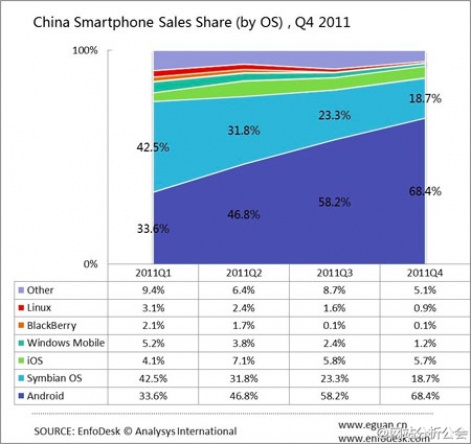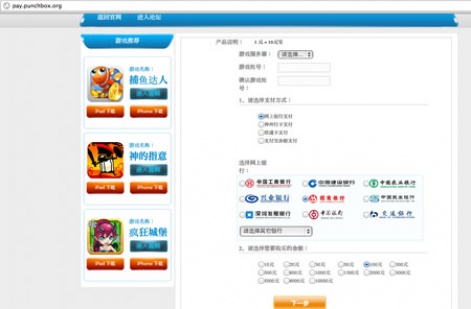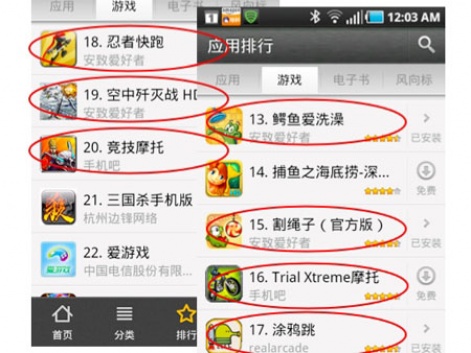Continuing our 'Show Me The Money' series about mobile gaming in China, this week we consider the Android market.
Everyone knows that Android is popular in China. But how popular?
According to Analysis International, a Beijing-based market research firm, Android accounts for 68.4 percent of the Chinese smartphone OS market.
What about iOS? A surprisingly low 5.7 percent.

However, in our experience, Android's 10x lead over iOS as suggested in this report doesn't quite add up.
Let's consider another data point from Fishing Joy, a freemium title from CocoaChina's game studio.
The game currently has 18 million installs on iPhone, 5 million on iPad and 38 million on Android devices. This sample suggests Android has a 1.5x lead over iOS.
So, while estimates vary, it's clear that the Chinese Android market is large - growing very quickly - and certainly one to consider.
Many shards
Of course, Android's biggest problem - fragmentation - is even more of a problem in China.
Outside of China, this pain point usually refers to the significant development and QA efforts required to support the large variety of Android devices and form factors.
But in the west, developers generally only need to build and promote their Android apps and games for at most three markets, Google Play, Amazon Appstore and GetJar.
In China, there are at least a dozen third-party Android markets with significant or noteworthy market share. This makes Android development in China a completely different playing field.
Following is just the beginning of a long list of larger Android markets in China. To add perspective, Google Play isn't even in the top 10.
HiApk
GFan
Wandoujia
Anzhi
Tencent's MyApp
360 Mobile Assistant
Souhu App Center
Digua
China Mobile
eoe Market
3g Android Market
AppChina
Mumayi
Such fragmentation means that any meaningful coverage of the Chinese market requires developers to create a separate package for each store, and develop a promotion strategy for a significant portion of those markets - most of which need to be executed in a non-English environment.
Cash in hand?
Western developers know that monetisation on Android is significantly weaker than that on the iOS platform, thanks to iTunes' frictionless payment experience.
The good news is that I predict the monetisation gap between Android and iOS will be somewhat less significant in China. And if you recall what I previously stated, the financial outlook for iOS market in China is not insignificant.
It is true that in China, fragmentation means developers have to deal with multiple monetisation and payment systems, which is a burden.
This is especially true for freemium apps with IAP as their main business model. Google Play isn't relevant and Google Checkout is pretty much nonexistent in China.
Developers either need to implement the payment SDK provided by local Android markets, such as gpay, or directly integrate their apps' economic system with a third-party payment platform such as Alipay, which involves great complexity both technically and procedure-wise. As a result, many developers must rely on advertising to gain minimal revenue.
On the other hand however, monetisation on iOS in China doesn't offer a significant advantage over Android. iPhones are only recently becoming popular in China and iTunes previously had a very minimal presence in the country. Therefore, iOS and Android are probably standing at the same starting line in terms of payment infrastructure and consumer adoption.
In addition, there's a trend for local developers to leverage payment methods that are more familiar to Chinese consumers, such as the online payment platform provided by CocoaChina's publishing arm, PunchBox Studios, to complement in-app payment.

Online payment platform for games by PunchBox Studios
Secure what's yours?
Finally, when discussing the Chinese content market, it doesn't take long before the conversation inevitably circles back to IP protection and piracy.
The lack of a consistent review mechanisms and control standards across a large number of local Android markets makes the open Google Play seem more like Apple's walled garden.
The following screenshot from a major Chinese Android market shows that pirated apps, in the form of the blunt repackaging of original APKs, occupy top ranking charts.

Clearly, this is a major obstacle for many developers.
Silver bullet?
As you can see, it can be very difficult to navigate the Chinese Android market due to fragmentation, complex monetisation issues, and difficulties surrounding IP protection.
Western developers seriously considering this market need to approach it with the help of a trustworthy local partner.
It's important to test your potential partner's understanding of, and capability in terms of their reach to distribute through local app store, their ability to handle payment in a unified fashion, and their determination and capability to fiercely protect your IP.
And if you want to know more about how CocoaChina can help in these areas, you only have to ask us.
Lei Zhang is CocoaChina's US general manager, driving the company's cooperation with international developers.
CocoaChina originated from an Apple-focused developer community.
In addition to hosting the largest mobile developer community in China, Chukong, the parent company of CocoaChina, is also a game publisher under the brand name PunchBox Studios, with more than 60 million installs across iOS and Android.























